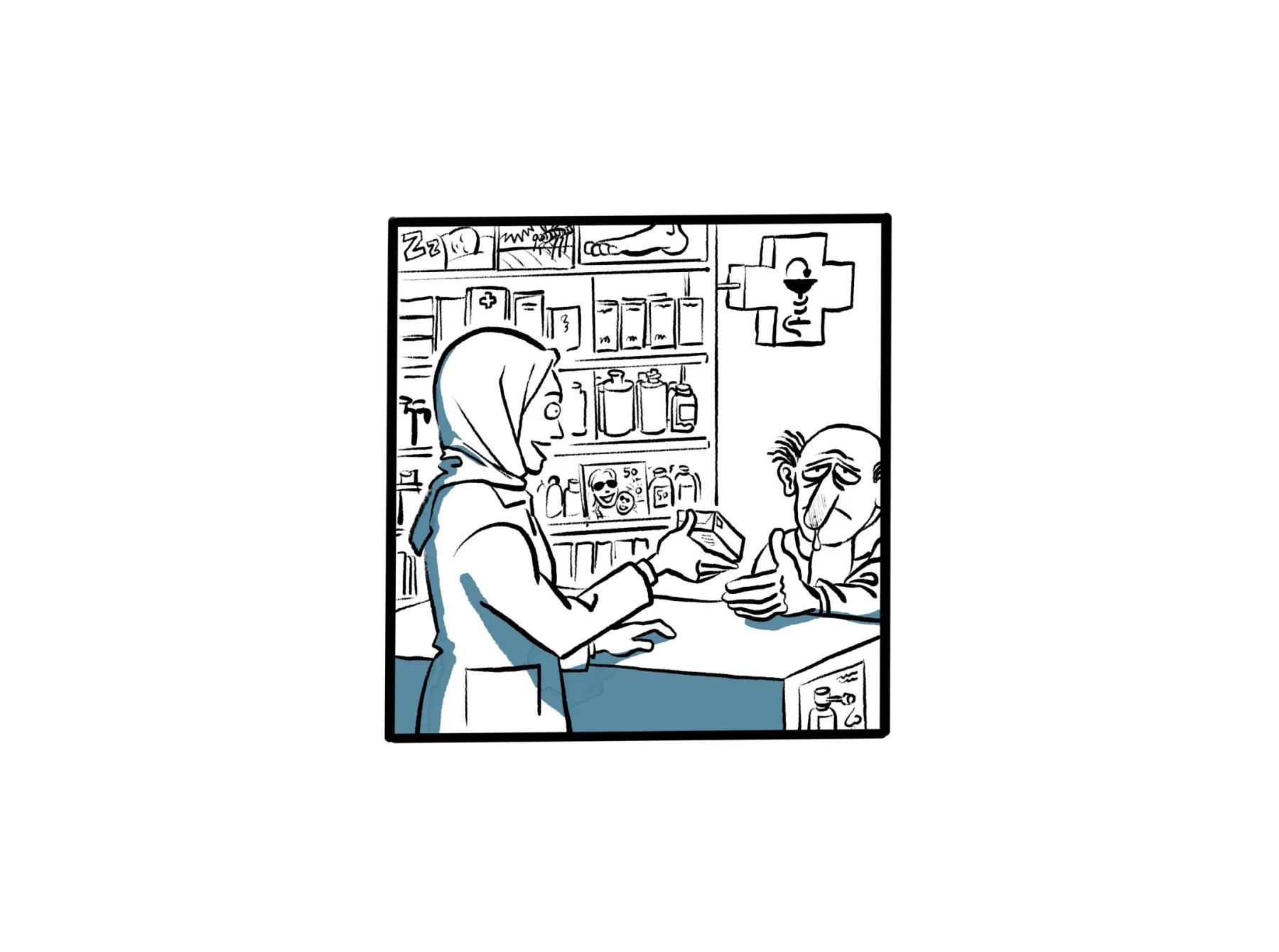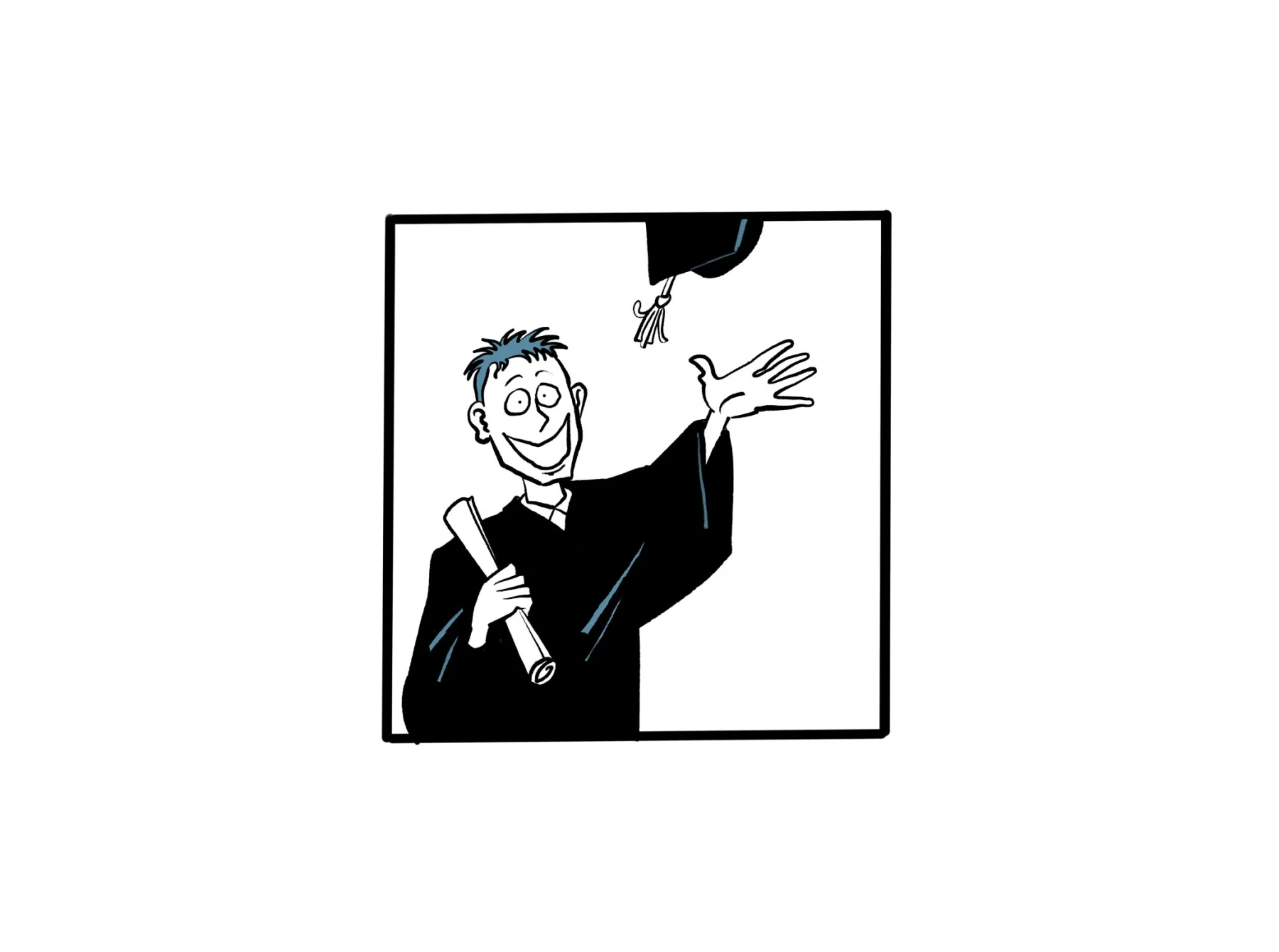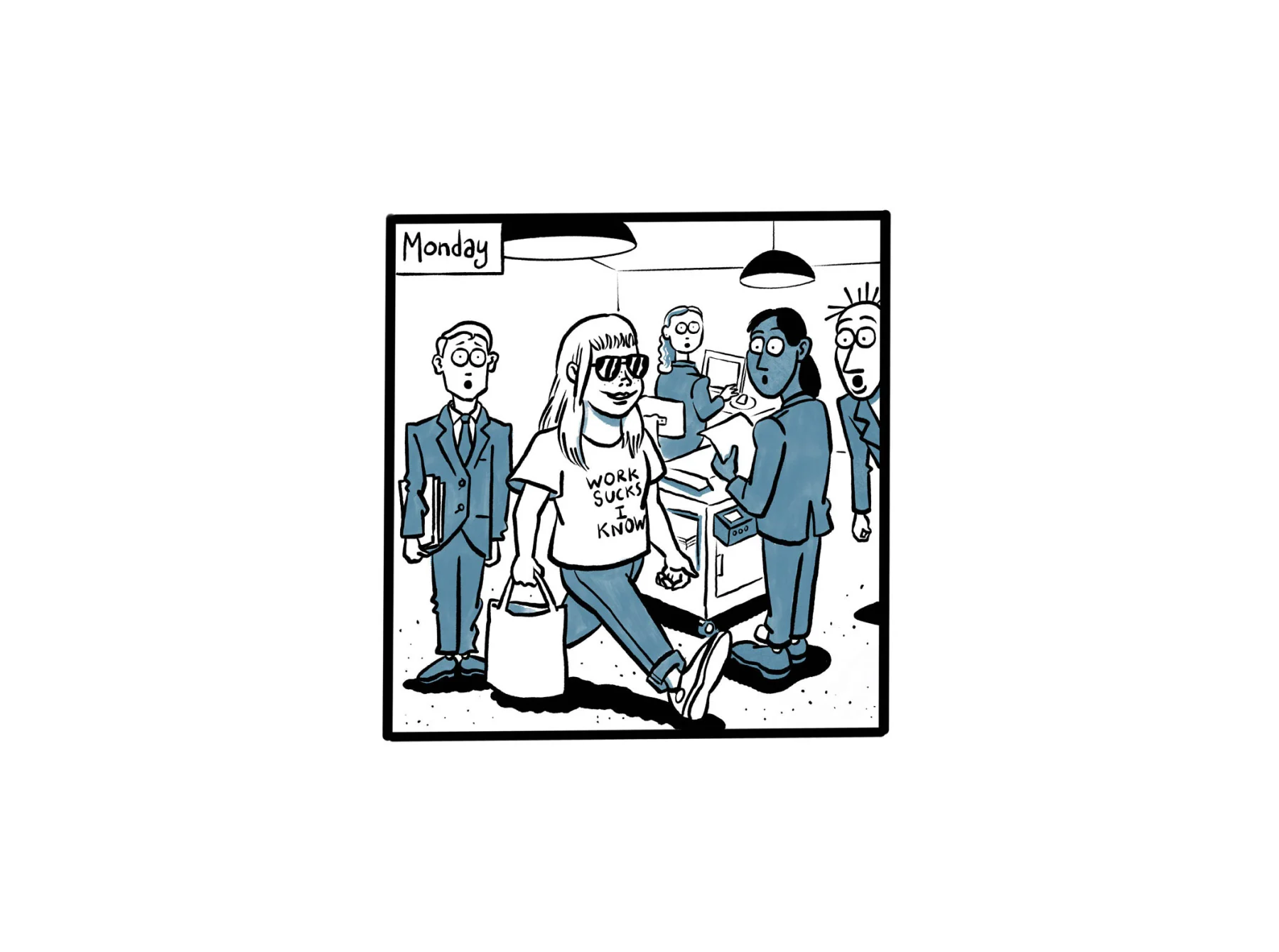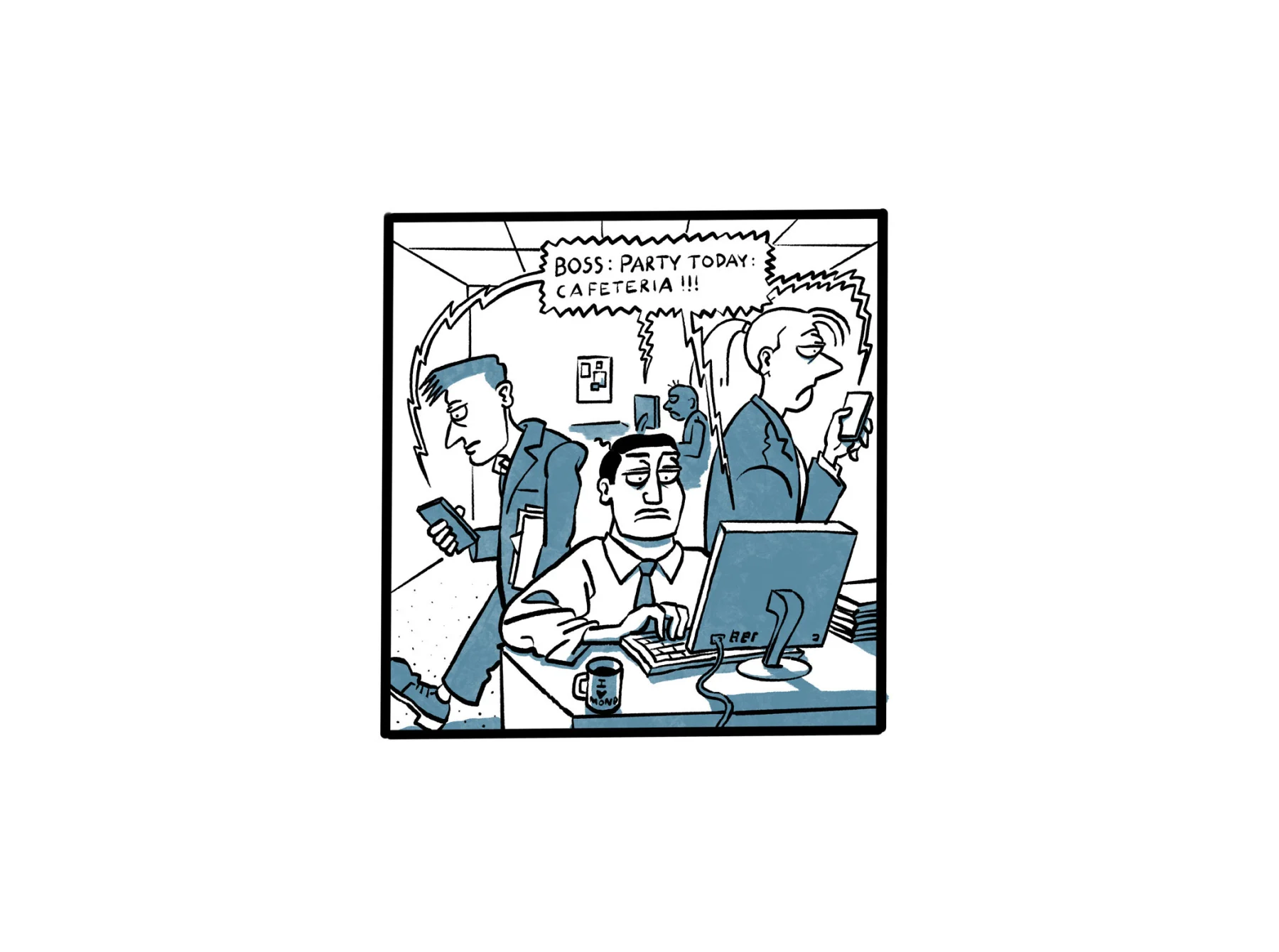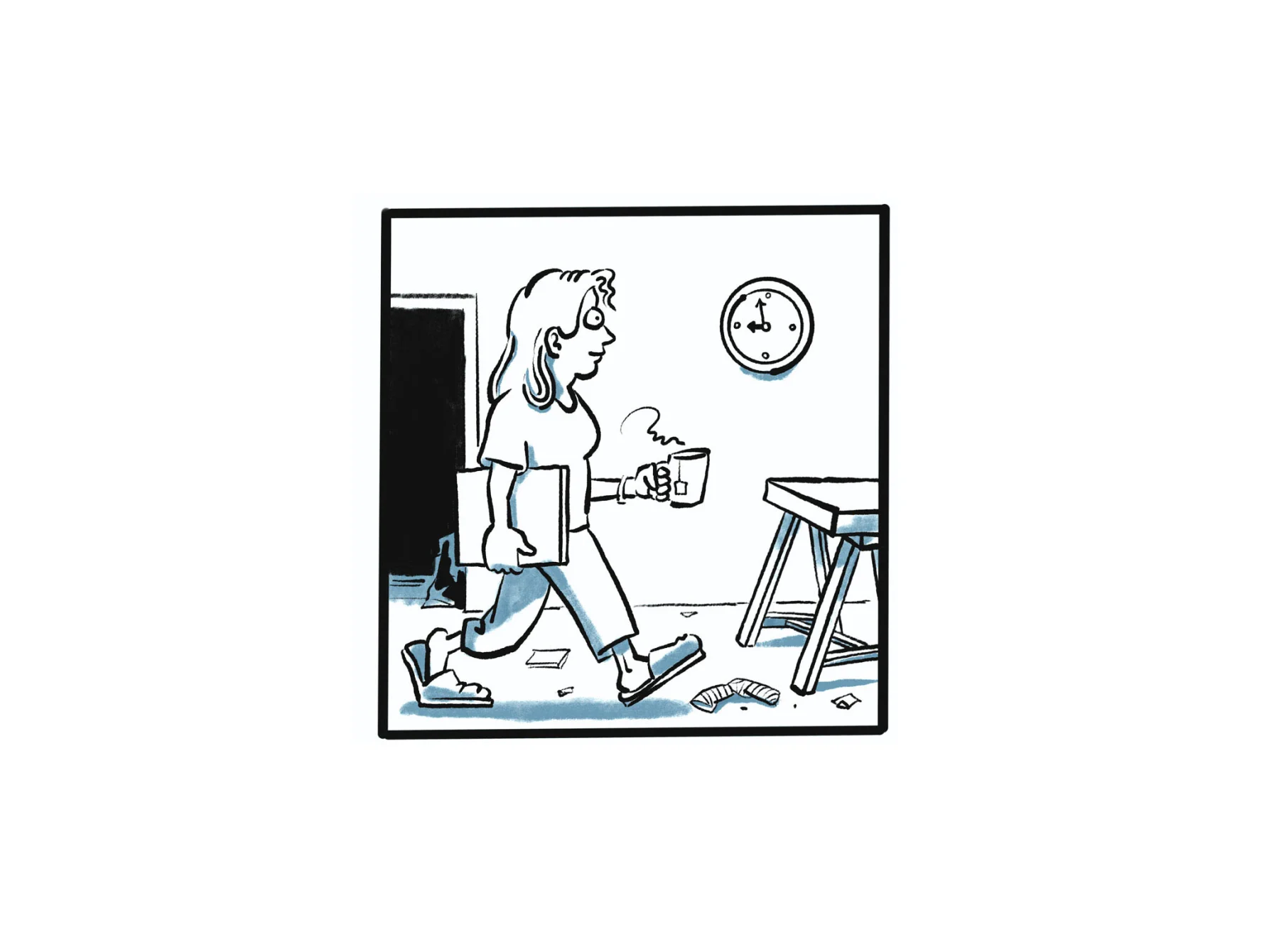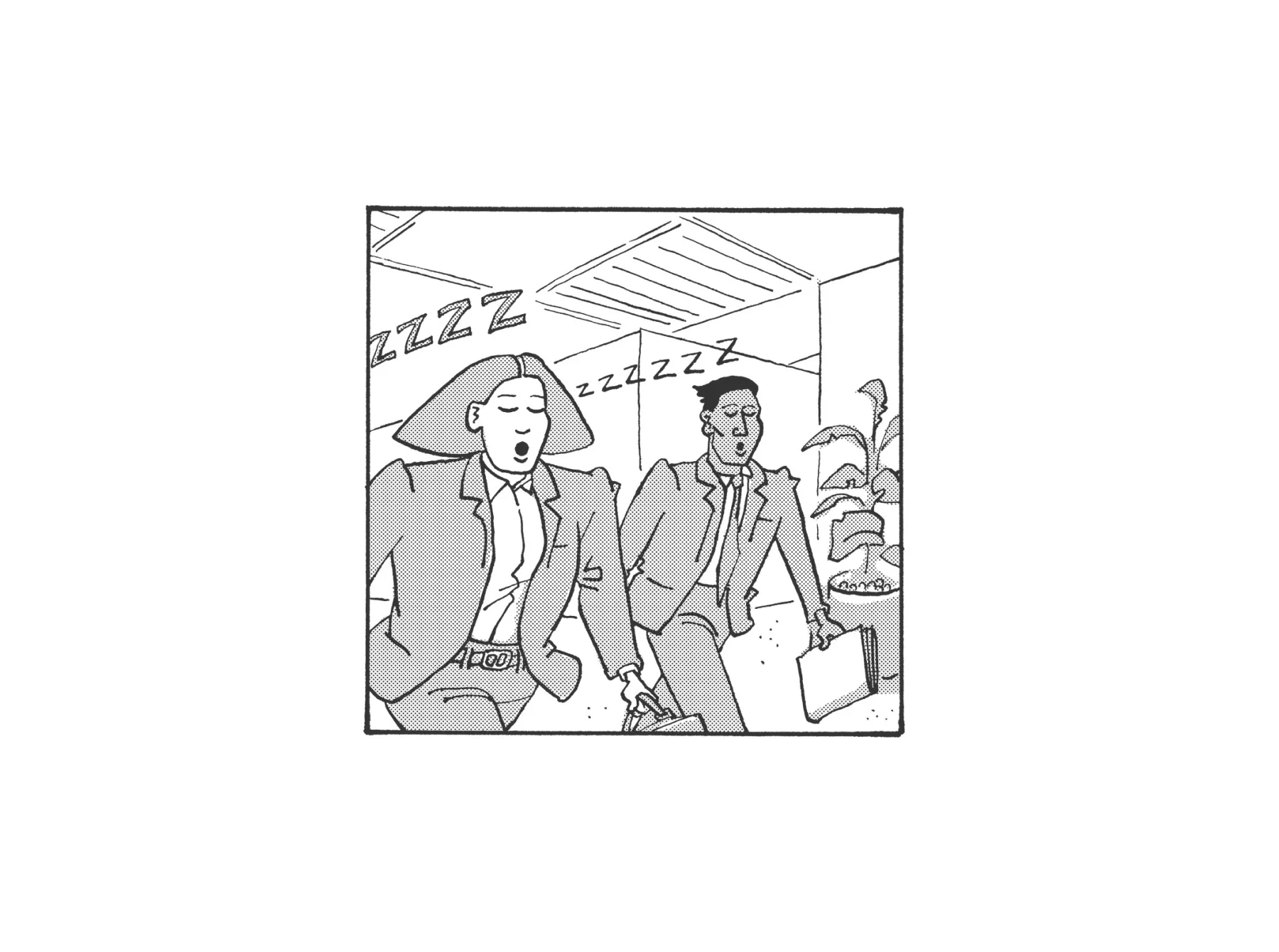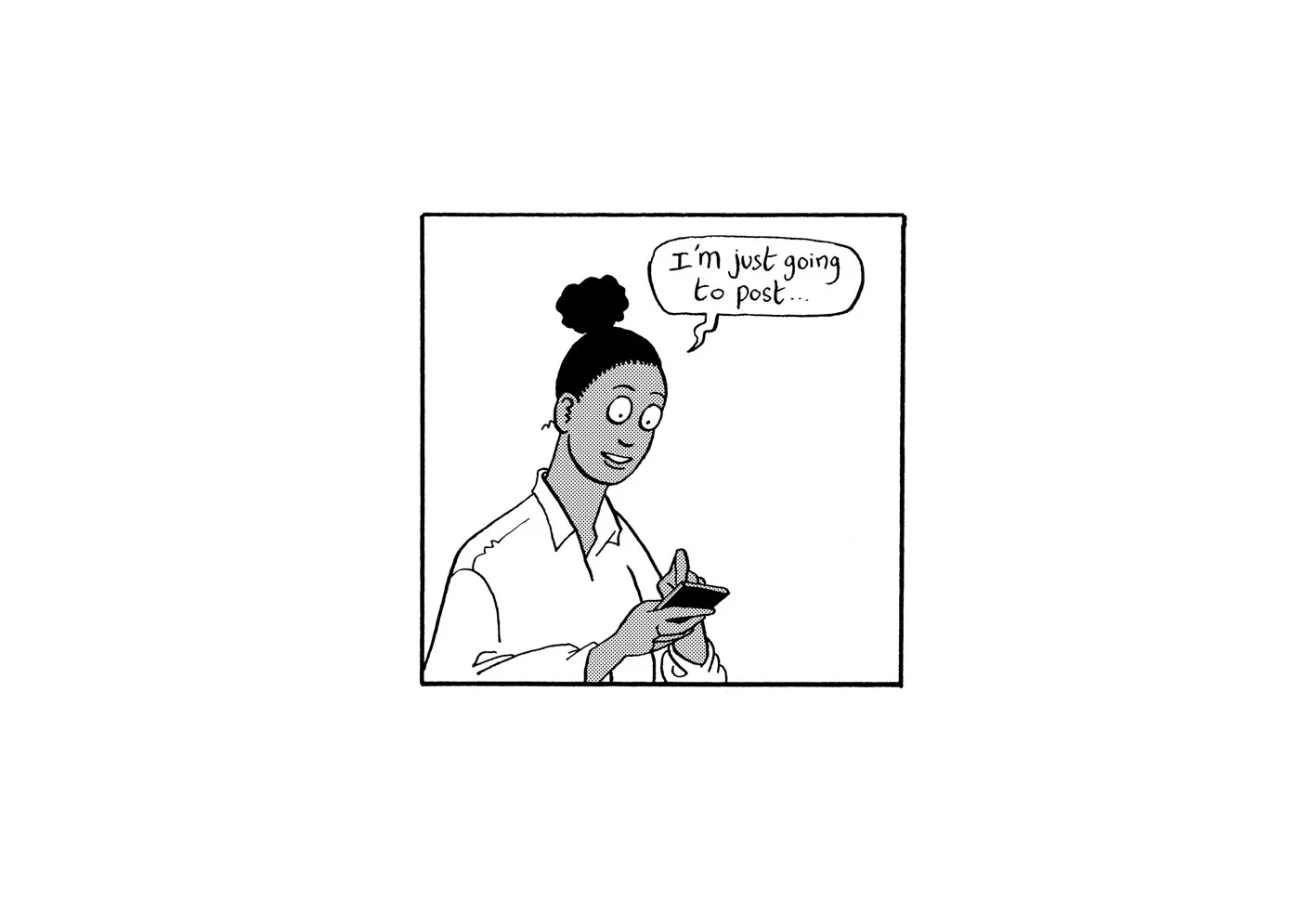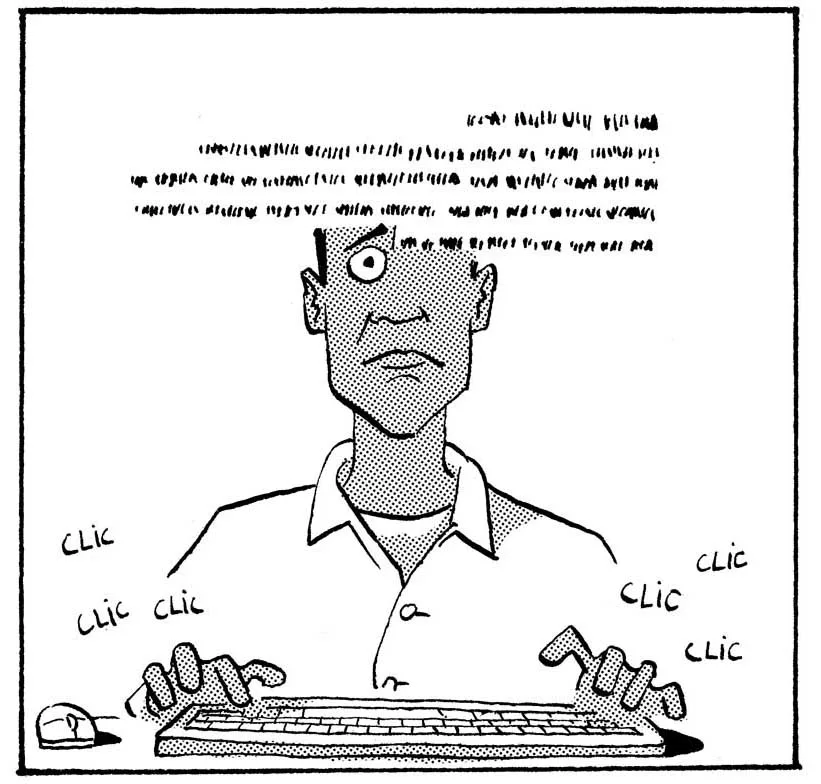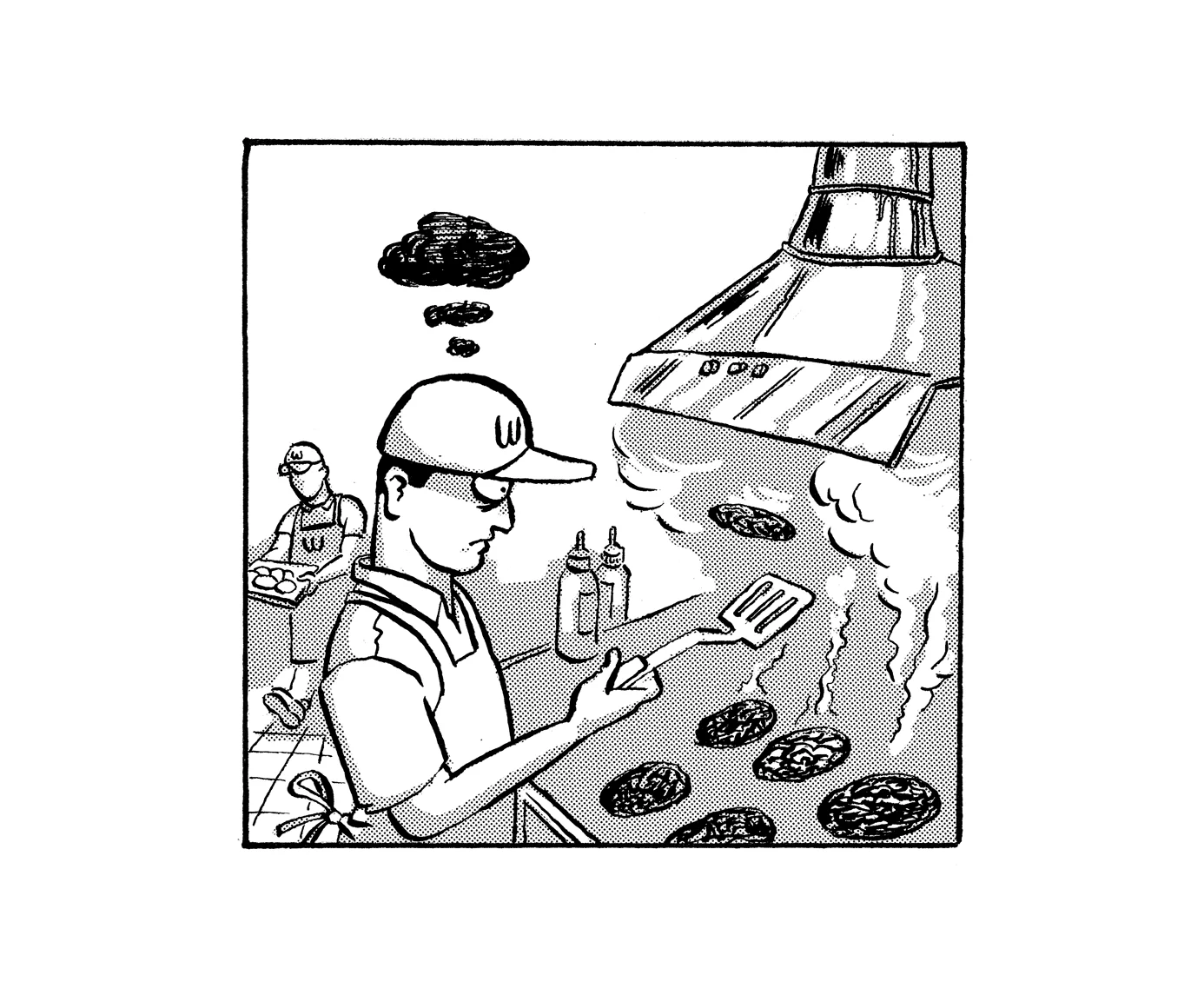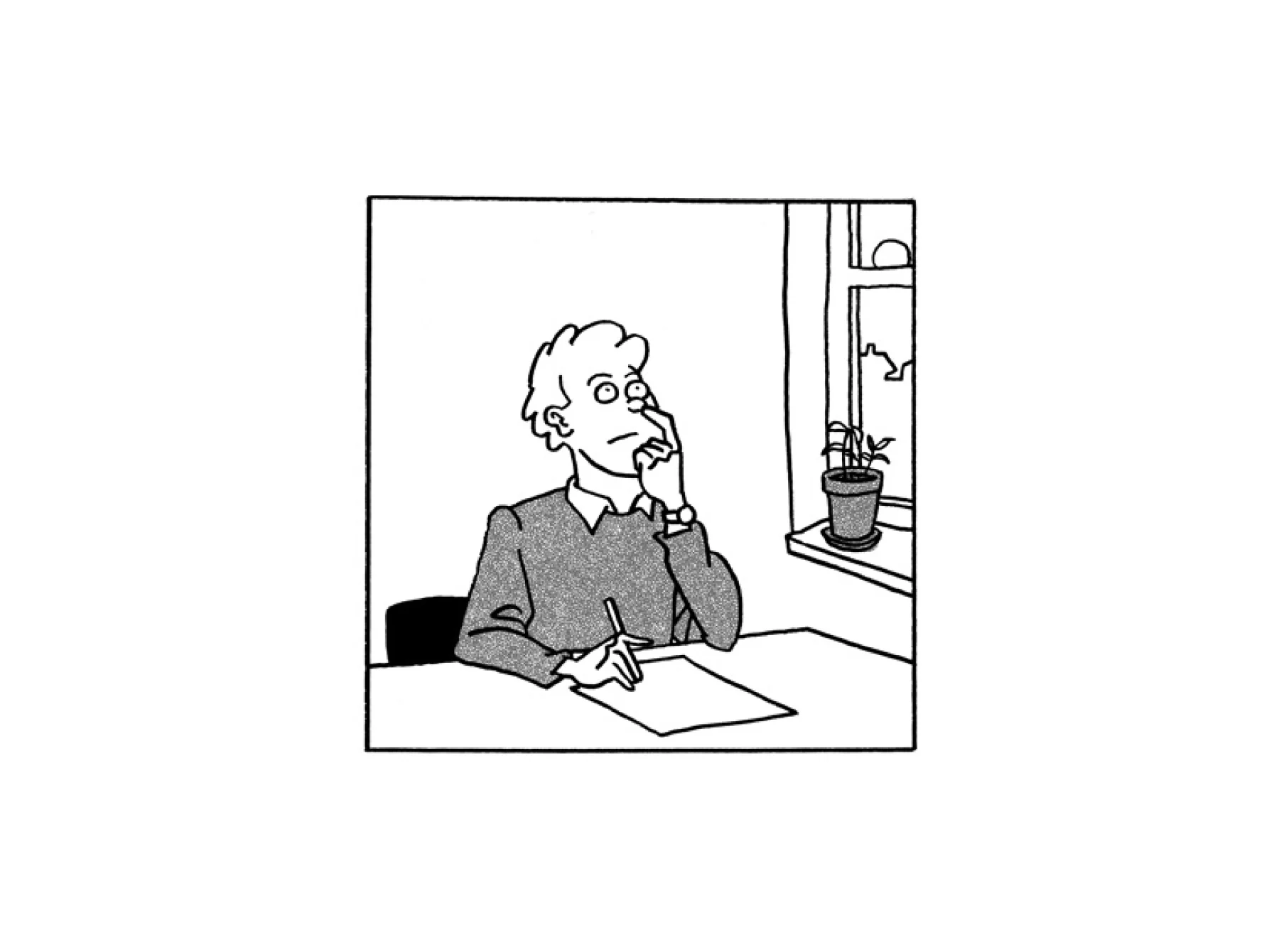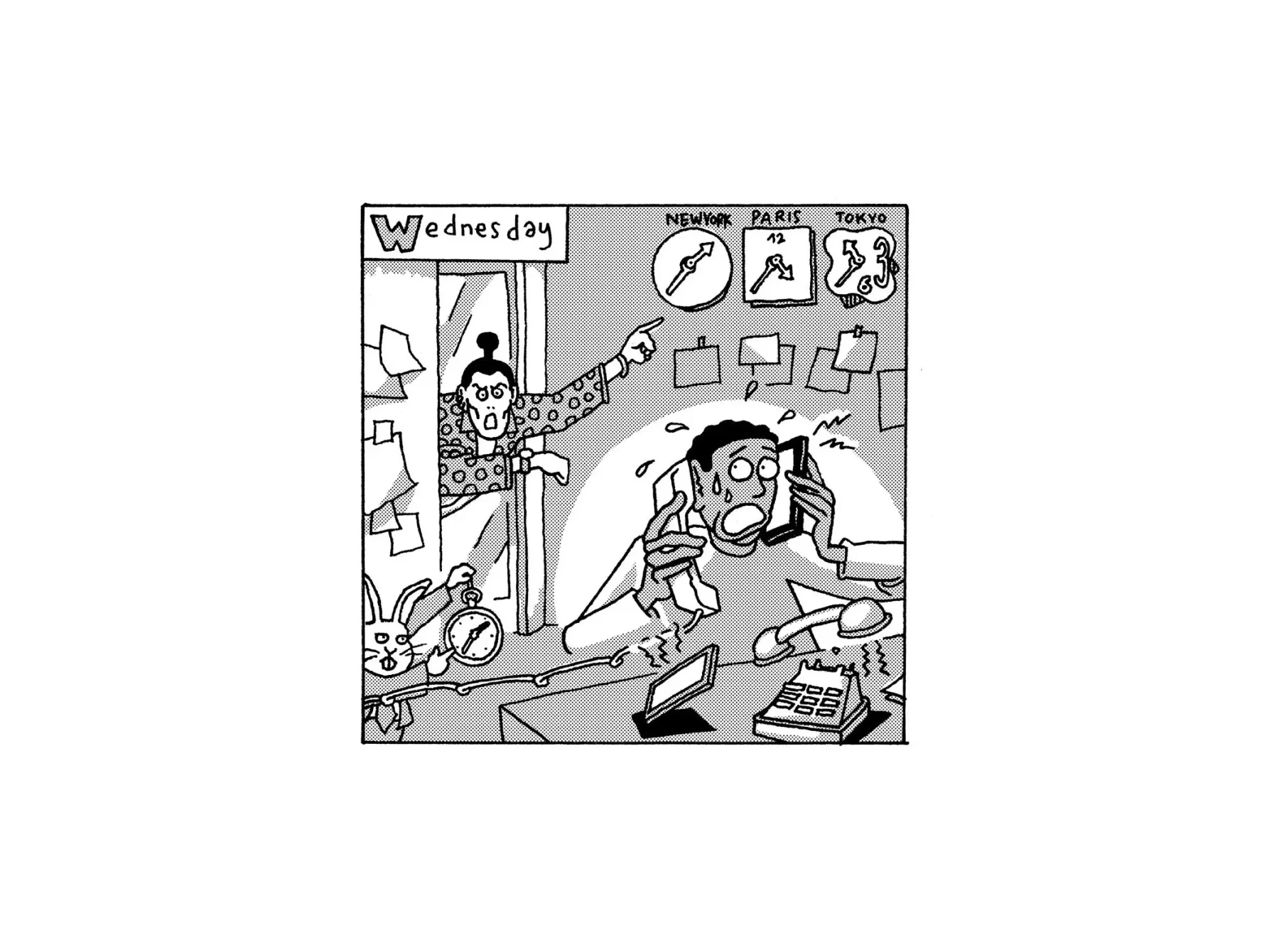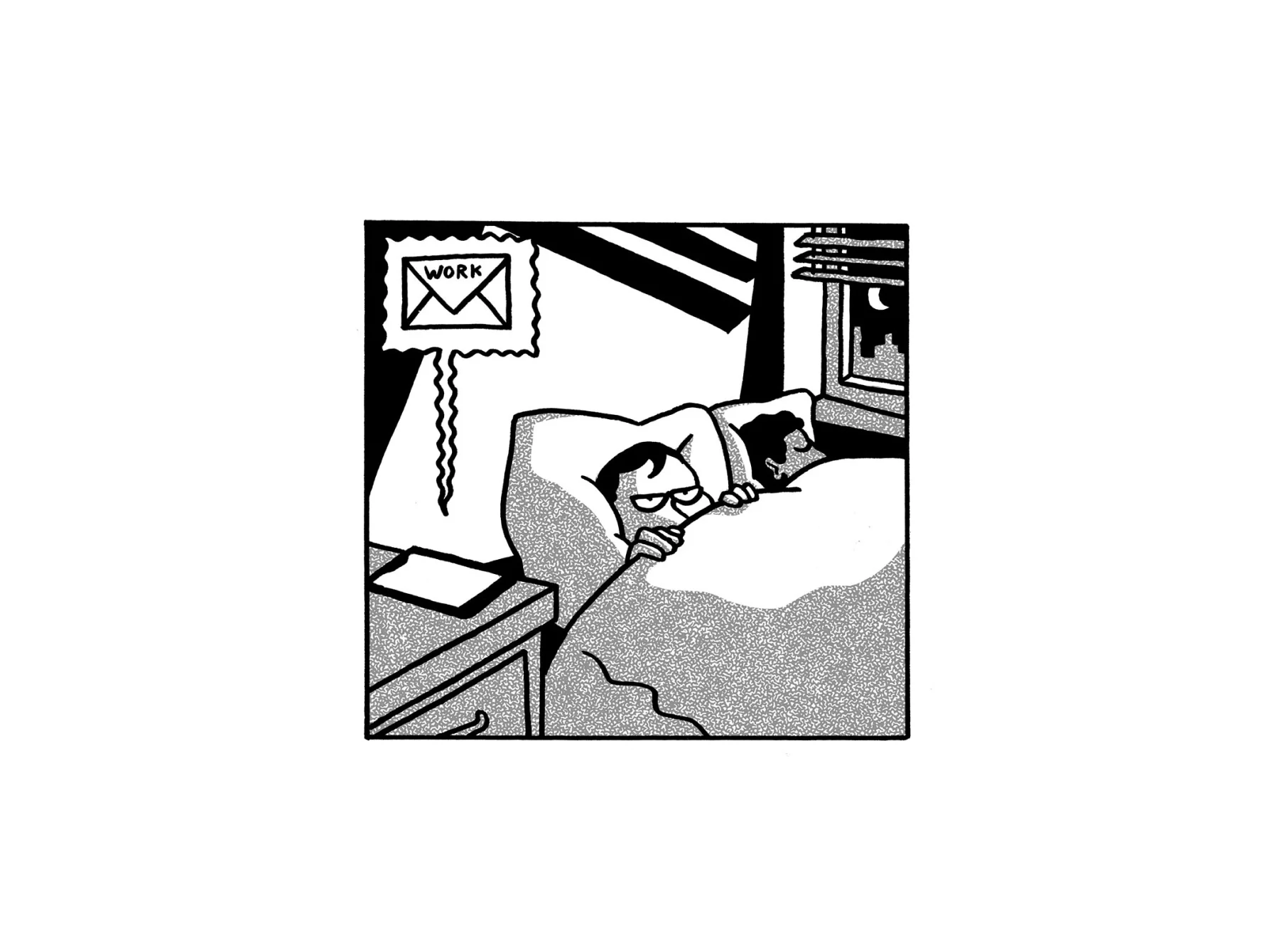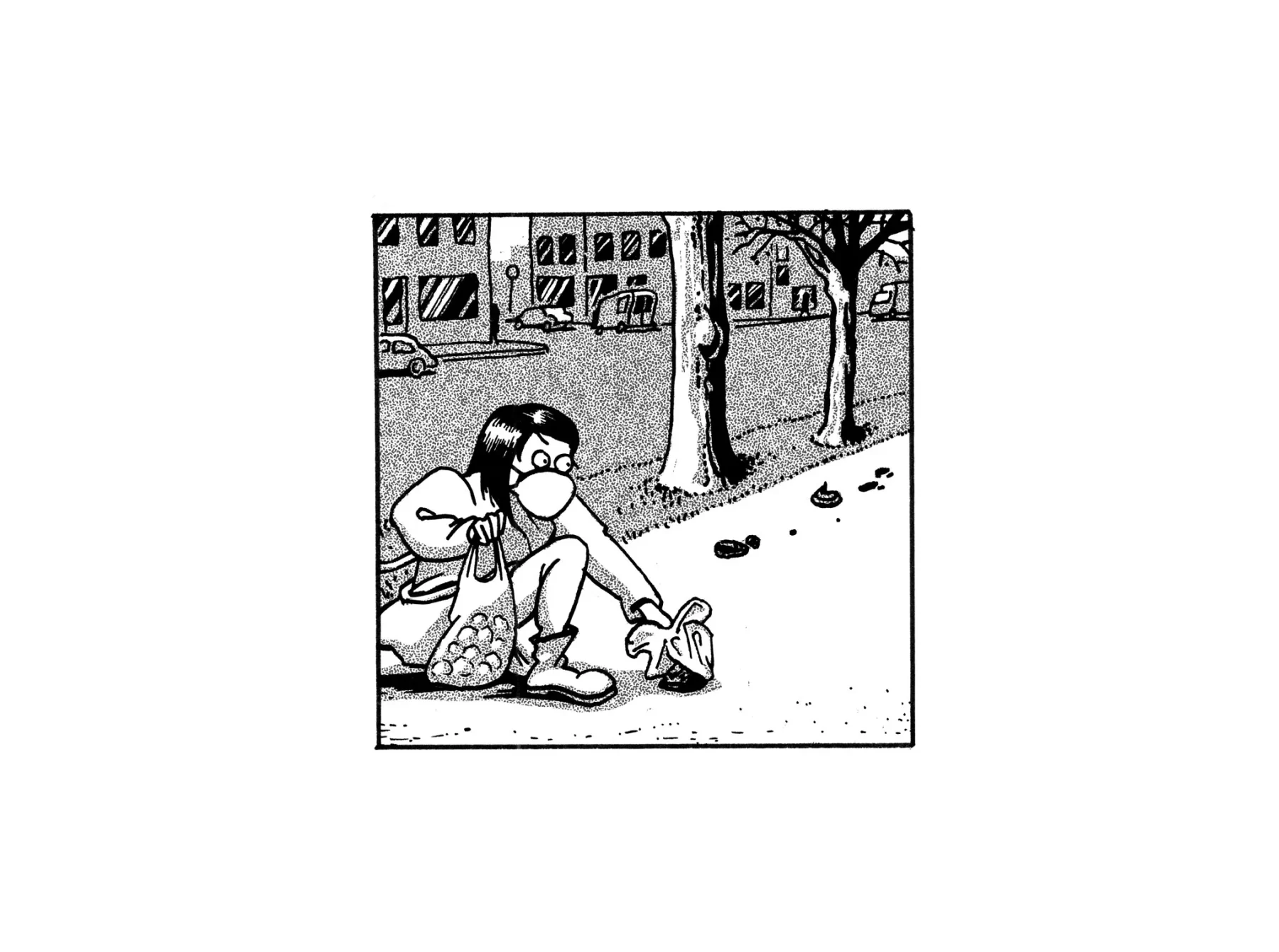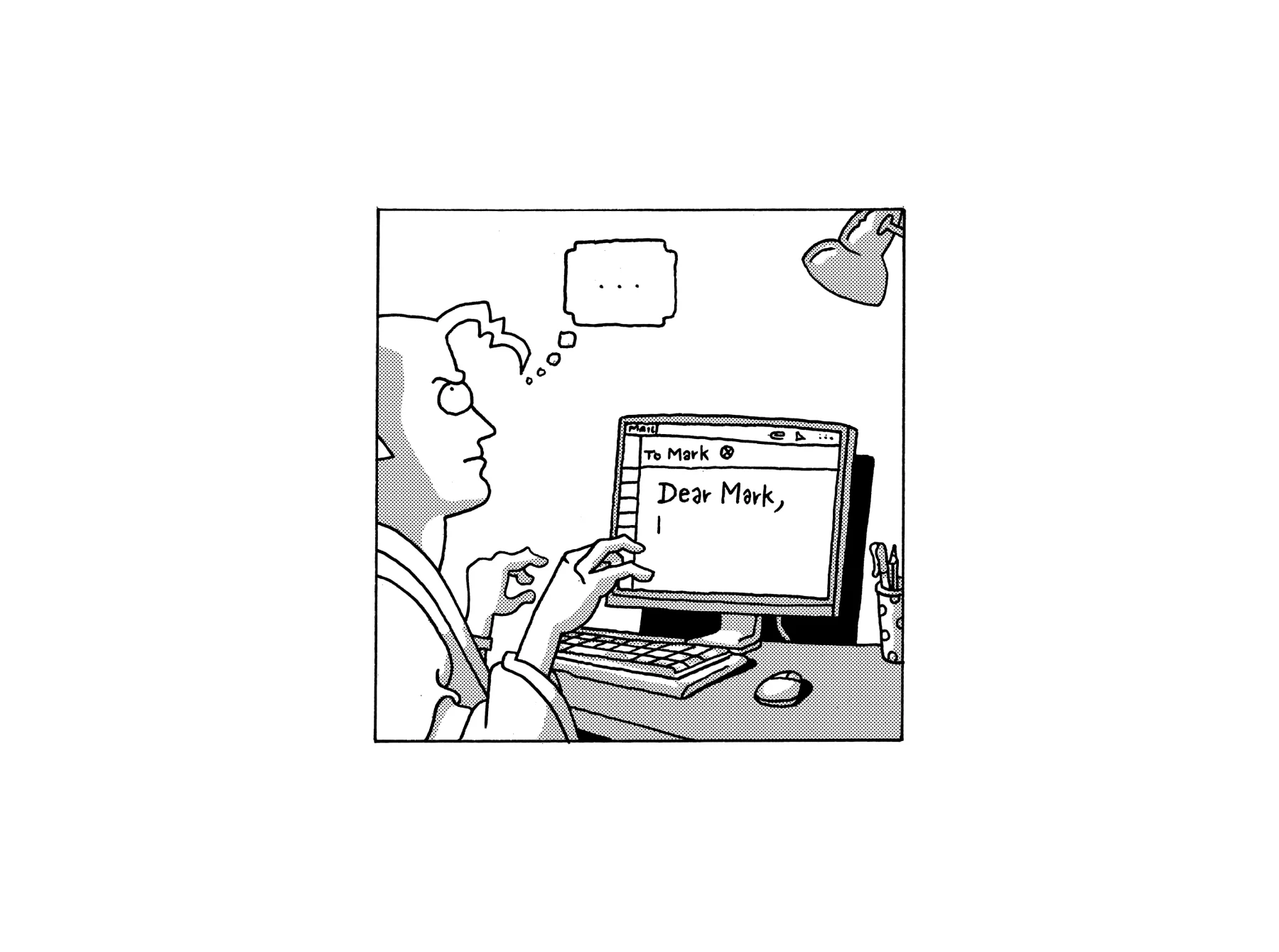
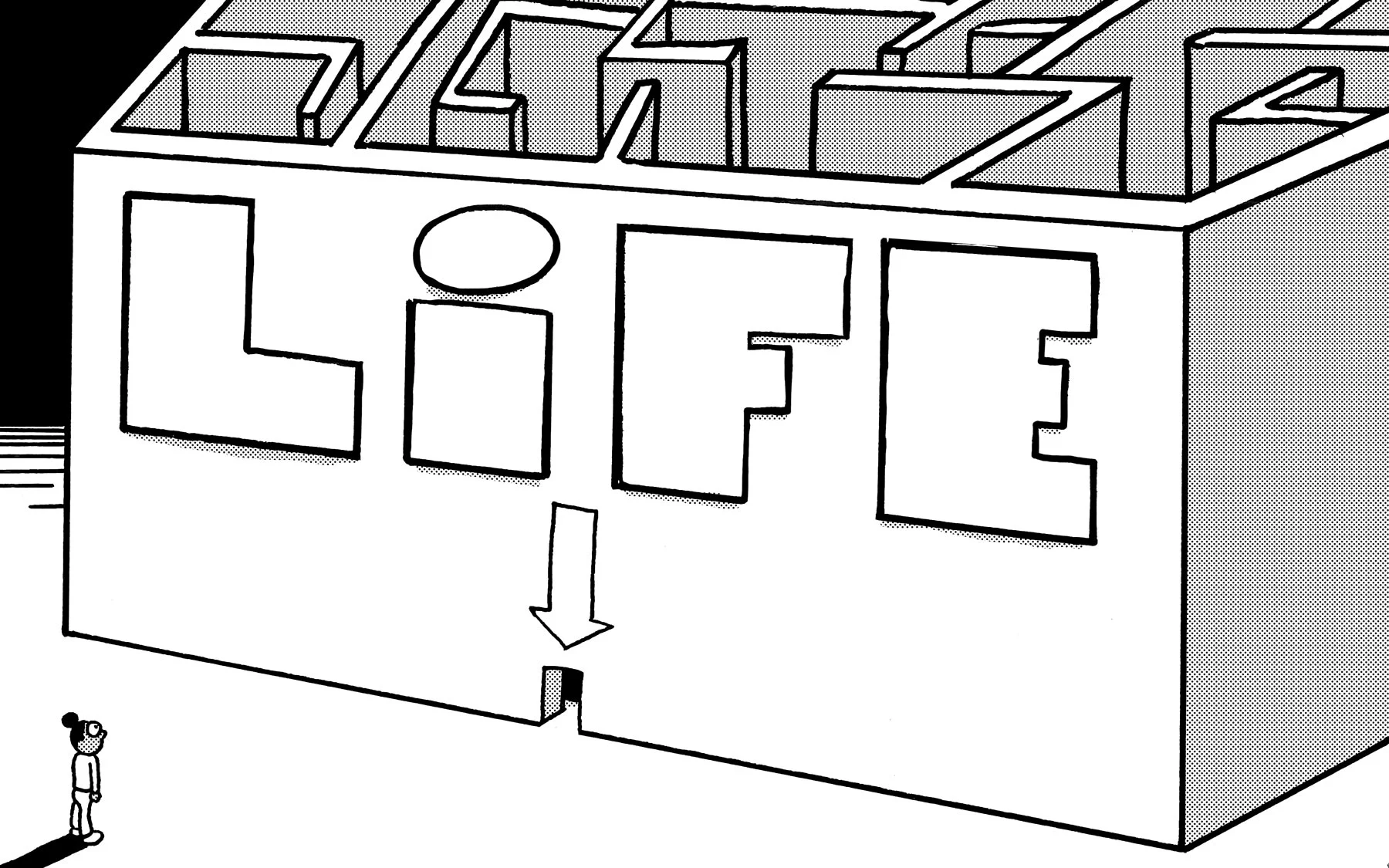
For one of the most run-of-the-mill questions in the world, asking someone “what they do” can elicit a complex answer. Here, writer, broadcaster and multi-hyphen media personality Gemma Cairney explores her roots in the noughties “slasher” economy and the path she’s taken to not doing one job, but a whole handful at once.
Comic by Baptiste Virot
What do I actually “do?” This is a question that changes in tone depending on who’s asking. Over the years, older people (unless they were once hippies or punks), have been almost bewildered when trying to work out what I do. Sometimes their confusion is so charged it can change their eyes to glow with concern, or haze over in total disconnect.
Then there’s the way in which this question has been asked by potential lovers, long-term partners or just mates trying to work out if my lust for life, music, culture, connection, combined with my inquisitive nature – so often entwining my personal and professional life – is all either incredibly exciting, or just plain jarring. On a few occasions, I have been sat around a table with a big group of friends, chattering away, and one particular mate will mime a hand-held microphone in the direction of whoever I’m talking to, as a friendly reminder that my curiosity can sometimes lead me to turning a casual chat into an in-depth interview. This is something I need to be aware of for my own sake as much as theirs. I’m a sensitive soul and soaking up the life story of everyone I meet like an emotional sponge isn’t always conducive to a relaxing and fun time for me, or really anyone around me. This is one of the many reasons I love to go out dancing – less talking, more moving.

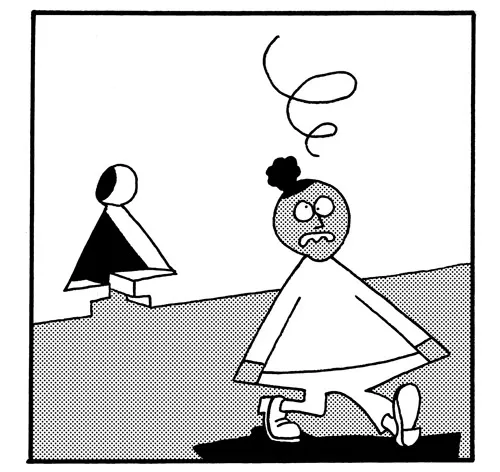
It will come as no surprise that I’m a communicator, storyteller and broadcaster. I’m not really a “TV Presenter,” but I can host live TV and have fronted documentaries for the telly and lead audio discoveries from podcasts to BBC Radio 4 series. I’m not currently a regular radio host with a show, but I have been before now. I love radio and I’m honored to be given great shows to cover on air.It’s taken some time to find the confidence to call myself a writer, but I am that too.
A huge part of my job is to talk, try to set a tone, rabble-rouse, inform, and host. This means that, especially in the last few years, I have had to get very used to the concept of boundaries. I’m into them! But I do feel like they are one of the newer lessons I’ve learnt along the way. And thankfully so, because they’re awesome! They’ve helped me to distinguish the differences of my evolving portfolio of work from the joys of a private life. It’s not as though there’s a user’s guide to Instagram that tells you it’s important to navigate and separate between what’s public, what’s professional and what’s private. I really could have done with that guide when social media exploded into our lives. There have been points in my career as it has evolved, where I have realized that my personality has actually been my job, which is bizarre. Though being paid in your twenties to stomp around a festival field and stick a microphone in a pop star's face was mad fun (and I genuinely couldn’t believe my luck, nearly all of the time), when I look back at my journey to being a working person in the world, I laugh at how boundaries seem such a new phenomena. I had to actually unlearn what I was taught at Drama School which was, essentially, to live and work without them.
We all threw ourselves with youthful resilience into a wild artistic training ground like excited puppies.

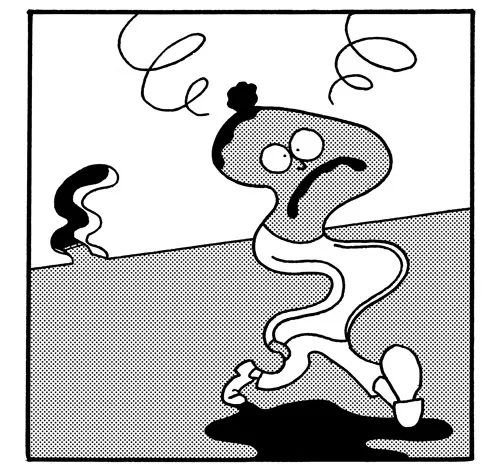
Between 16 and 18 I studied Theatre at The BRIT School for performing arts. It was the turn of a new millennium: a hangover from the ladette, ravey, modem-whirring, girl power swirl of the 1990s. I was seeking a way out of a conservative southern England, commuter-belt town where there were no Black people apart from myself and my sister. The rebellion I had found in hanging out with boys who smoked stinky strains of weed and wore gigantic jeans had reached its limits. Finding The BRIT School, the UK’s only free performing arts school, meant freedom for teenage me. It embraced difference. Unlike at the girls’ school I had recently graduated from, I wasn’t punished at the BRIT School for asking questions. The arts and the avant garde felt like a safer space to explore and be educated, a far cry from the stifling, strict, academic setting I’d become used to while studying for my GCSEs.
Despite getting told off quite a lot and labelled a bad influence, I achieved A grades in English and Drama by the time I left secondary school. To get a place at The BRIT School, to suddenly be around people like me (because BRIT was free, it was attended by probably the most diverse mix of people I’ve institutionally worked and trained with to this day) and to have my ideas nurtured, it felt like home. We all threw ourselves with youthful resilience into a wild artistic training ground like excited puppies. We learned about stuff you just wouldn’t anywhere else: we spent a whole term studying the Velvet Underground! Now, at 36, I know that to be seen, to be supported, to be welcomed and to be yourself are fundamental parts of humanity. I’m grateful that the BRIT School was accessible and classless. It was an incubator for talent to be unearthed from all walks of life. Of which there always is so much, especially if your lineage has faced any type of adversity.
I have a hunch that actually grasping the living, not making a living, is most important of all.

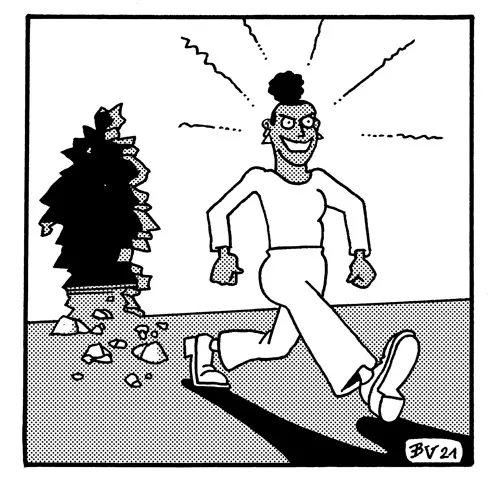
Fast forward to my early twenties, stomping about East London, the bubbling fun and imagination rippled on. It was tough in some ways: we lived in tiny, weird, dank places, but we were young and still free. My crew of like-minds were broadly-labelled “slashers.” This was a catch-all term born back when the world was a bit trashier, when this bold corner of the city was reverberating with people who defined themselves as a DJ/Club Kid/stylist/model/whatever. At the time, my boyfriend was a music PR by day and remixer/club night promoter/DJ by night and all of it – the sticky dance floors, clunking GarageBand-made sounds, the vintage dresses I wore to each night out – meant the world and more. As did the creative pursuits of the brilliant people around me. We supported one another in our alternative communities: gleefully getting “real” jobs, then turning up to do them with a catwalk stomp, head-to-toe in charity shop bargains.
Gigs, parties, dancing, gigs, parties, dancing…some of us ended up with shiny record deals, or jobs in fashion. If any of us at that time thought that what we were doing was work, we were delighted by it. I was thrilled to be a slasher: styling fashion shoots for musician and photographer friends, hoping to get acting work and excitedly devouring The Stage for auditions every week, while working as a tequila girl to pay the rent. I was 20 and it was gloriously exciting to be in a thriving DIY scene in a time before we all got too self conscious and the term “influencer” was coined. It didn’t feel like we were trying to influence; we were trying to bounce about in counterculture and impress our mates. It was only when our city got so expensive to live in that the “job” side of life became more important than the enjoyment of living it.
The years I spent on the periphery of fame and showbusiness were thrilling in parts, but mostly terrifying and exhausting.
So how did I get from being a slasher to what I do now? Do I even know what I do now? This is a question that, on occasion, has hummed amongst my bouts of inner worry, clung to past traumas and mistreatment, and morphed into self doubt. People are sometimes shocked to hear this, because I smile a lot. But I’ve done loads, learned loads, lived loads and in quite a short amount of time. I’ve also had to work incredibly hard for opportunities to do so. It’s one of the reasons I smile, because I’m thankful to have survived it all and to still be in love with humankind.
I’ve circumnavigated a society that craves definition and applauds institutional accolades. One that favors the Western understanding of getting a “grade” followed by a job title. When all the while we’ve wriggled around for meaning and categorization through the gaze of a dated, conditioned, white patriarchal system. This has changed what we’ve understood as normal and aspirational when it comes to our life decisions: where we put our money and time, how we feel about basic aspects of living or the way we look or present ourselves.
Up until recently it has been completely normalized to consistently push ourselves beyond our capacity to work, and therefore “achieve.” I noticed the more I contorted myself to the allure of capitalism and in a way that the media would have me believe will make me feel happy and define what success and validation is, the more it became troublesome. Without interrogating who’s actually in charge of both capitalism and the media we deem important, it can way too easily become problematic to our thinking. I feel like I’ve learnt, albeit the harder way, that to be seen as “different” is better for me. I honestly tried to swim through the overwhelming undertow of mainstream culture as I thought that’s what “growing up” was.
It proved not to be the right place for me to grow into a woman with an identity made up of lots: Blackness, the natural world, wanderlust, multiculturalism, weird art, a genre-less love of music and big dinner parties too dimly-lit with candles to take a good photo to put online. The years I spent on the periphery of fame and showbusiness were thrilling in parts, but mostly terrifying and exhausting. To cut a long story short. I’m a woman, I’m Black. It’s been confusing and hard and I get a strong hunch that it wouldn’t have been quite so if I was a man, or white. But I like who I am and I love who I surround myself with.
It was only when our city got so expensive to live in that the “job” side of life became more important than the enjoyment of living it.
After years of being a slasher (and proud) it was the allure of audio that summoned me in the end, as did a calling to write. I’ll never forget writing a lonely post on Facebook a few summers ago, about how I was buckling under what seemed the ever normalized pressure cooker that being insanely busy feels like. In the post, I listed the projects I had going on at once. I was exec-producing a DIY punk musical under the umbrella of my self-funded production company while also touring my first published book (a young adult guide to life, called Open, that I wrote after making a short documentary uncovering some of the issues affecting young people, that I think needed to be more openly discussed). I was ricocheting (as ever) from pillar to post from pillar to post as the stand-in for different radio shows – whenever the big bosses deemed me the right person – and constantly going to meetings trying to pitch new ideas for TV, podcasts, articles, more, more, more…My enthusiasm for every bubbling potential project was real.
I had enough energy to build teams, explore my interest in activism and be thrown into the fast-moving river of progress. I also had and still have a very vivid imagination that knows the power in dreaming and talking about hope too. But despite feeling ambitious, alive, constantly inspired and as if I had a fire in my belly, I was also... tired. I was tired of having to dance beneath a glass ceiling, tired of the fact that I was earning less, tired of seeing my ideas taken from meetings and then handed to my paler-skinned peers. I was tired of bemusing people, tired of not being able to be put into a box and tired of feeling like I constantly had to prove myself – to prove my passion, or dare to say it, expertise. Now, in my mid thirties, I’ve found a calm forged out of grief. I’ve worked out that I wasn’t going mad, that I was reacting to things being genuinely difficult. I know what my work is now, too.
All things considered, I love what I do. I understand it now. I hope to be able to cultivate a varied and fulfilling career for decades more, one that continues to express my true respect for arts and culture.
As for the dreams, they haven’t stopped. I hope to write more books. I always want to explore and document this safari of music, joy, pain, healing and expression on the box and on the radio. But at the same time I relish my time off, look after myself and bring good times and care for those that I love the most. Because I have a hunch that actually grasping the living, not making a living, is most important of all. I want to exist in a world that lets us all live out our full potential, in the magical ways life can lead us to evolve, change, try, collaborate, learn and always grow.



